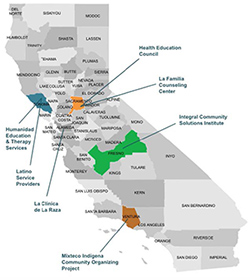California Reducing Disparities Project
Technical Assistance Provider for Latino Community-Based Organizations Implementing CDEPs

Since 2016, UC Davis Center for Reducing Health Disparities has served as a Technical Assistance Provider (TAP) for seven community-based organizations (CBOs) implementing Community Defined Evidence Practices (CDEPs) to reduce mental health disparities in Latino communities as part of the California Reducing Disparities Project (CRDP).
CRDP is a statewide prevention and early intervention effort to reduce mental health disparities in historically underserved African American, Asian and Pacific Islander, Latino, Lesbian, Gay, Bisexual, Transgender, Queer/Questioning (LGBTQ), and Native American/Alaska Native communities.
The project’s first Statewide Evaluation Report demonstrated strong evidence of the value of investing in CDEPs for reducing mental health disparities. The study found that for every taxpayer dollar invested in CRDP, there was an estimated return of over $4 dollars.
Our team’s technical assistance, training and capacity building for CBOs has emphasized Community Health Worker/Promotora workforce development, culturally informed program evaluation, organizational development and sustainability.
Please click on each tab below to learn more about our seven (7) partners and their CDEPs.
Mente Sana, Vida Sana
Mente Sana, Vida Sana is a Community Defined Evidence Program (CDEP) from Health Education Council (HEC), a Sacramento-based organization. Health Education Council’s mission is to cultivate health and well-being among underserved communities through prevention and early intervention and with an emphasis on community collaboration.
Mente Sana, Vida Sana is a community-defined prevention, early detection and treatment program providing mental health screenings to reduce chronic diseases among the most vulnerable Latino populations who are greater risk or suffering from mental illness.
To learn more about the project, review Health Education Council's Mente Sana, Vida Sana summary (PDF).
CommUnity Convivencias
CommUnity Convivencias is a Community Defined Evidence Program (CDEP) from Humanidad, a Santa Rosa-based organization. Humanidad’s mission is to bridge the gap between cultures to reduce accessing and utilizing mental health resources.
CommUnity Convivencias is a community-based counseling convening that engages community members in conversation about mental health with the aim of increasing education and awareness of accessible and available treatment.
To learn more about the project, review Humanidad's CommUnity Convivencias summary (PDF).
Pláticas and Atención Plena
Pláticas and Atención Plena is a Community Defined Evidence Program (CDEP) from Integral Community Solutions Institute (ICSI), a Fresno-based organization. ICSI’s mission is to ensure community health through advocacy and systems change that promote wellness of body, mind, spirit, and soul.
Pláticas means of transmitting knowledge about wellbeing through songs, stories, and poetry. Atención Plena means the practice of mindfulness or one’s mental capacity to accomplish self-awareness, inner-peace, and being attentive to one’s surroundings.
To learn more about the project, review ICSI’s Pláticas and Atención Plena summary (PDF).
Cultura y Bienestar
Cultura y Bienestar is a Community Defined Evidence Program (CDEP) from La Clínica de La Raza (La Clínica), an Oakland-based organization. La Clínica’s mission is to improve the quality of life of the diverse communities by providing culturally and linguistically appropriate, high quality, and accessible health care for all.
Cultura y Bienestar is a Latino-focused prevention and early intervention program that provides outreach, education, and consultation to individuals and organizations that serve the most vulnerable Latinos in Alameda County. Cultura y Bienestar staff consist of mental health specialists, promotores, and traditional healers who promote mental health and emotional wellbeing.
To learn more about the project, review La Clínica’s Cultura y Bienestar summary (PDF).
Cultura de Salud
A Cultura de Salud is a Community Defined Evidence Program (CDEP) from La Familia Counseling Center (La Familia), a Sacramento-based organization. La Familia’s mission is to improve the quality of life for at-risk youth and families of diverse backgrounds and empower them to succeed in life.
Cultura de Salud is a service delivery model with an emphasis on:
- Treating both the person and the community.
- Providing services inside the community by culturally and linguistically appropriate staff.
- Establishing a sense of shared responsibility to community wellness.
- Recognizing and respecting cultural, family, and community values.
- Empowering families.
- Engaging and immersing one-self in the Latino community.
- Integrating the extended family as part of a treatment plan.
- Appreciating and embracing the lived/life experiences of a community.
To learn more about the project, review La Familia's Cultura de Salud summary (PDF).
Testimonios Project
The Testimonios Project is a Community Defined Evidence Program (CDEP) from Latino Service Providers (LSP), a Santa Rosa-based organization. Latino Service Provider’s mission is to build a healthier community by serving and strengthening Latino families and children by reducing racial and ethnic disparities.
Testimonios Project is a designed to reduce stigma associated with mental health and increase mental health literacy in the Latino community. From a workforce perspective, Testimonies also recruits, trains, and mentors young people in the work of advocacy and promotores.
To learn more about the project, review Latino Service Provider's Testimonios Project summary (PDF).
Living with Love (Viviendo con Amor)
Living with Love (Viviendo con Amor) is a Community Defined Evidence Program (CDEP) from Mixteco Indígena Community Organizing Project (MICOP), an Oxnard-based organization. MICOP’s mission is to aid, organize and empower the indigenous community.
Living with Love is a prevention and early intervention curriculum that was created to address mental health issues such as, depression, anxiety, stress, among others. Living with Love also helps to detect early the risk factors that are associated with mental health issues. For example, domestic violence, isolation from community life, stigma associated with mental health, and lack of information and resources about mental health treatment.
To learn more about the project, review MICOP's Living with Love (Viviendo con Amor) summary (PDF).

